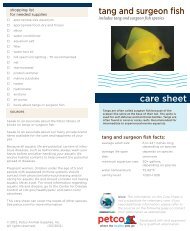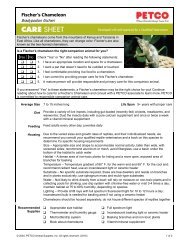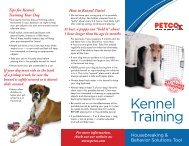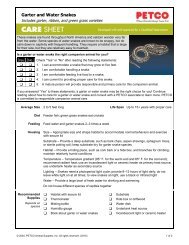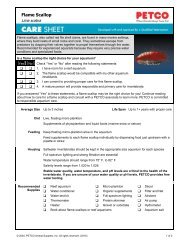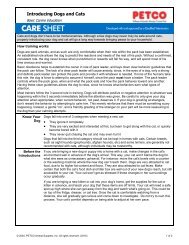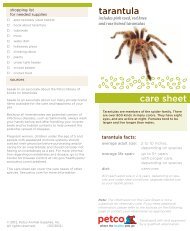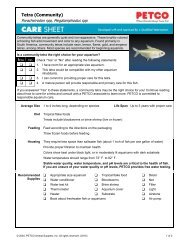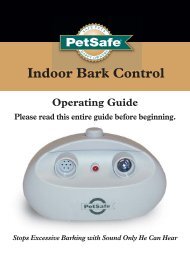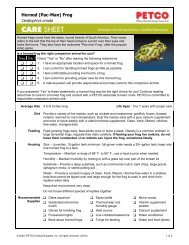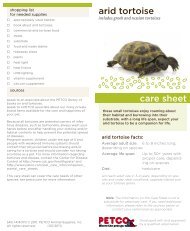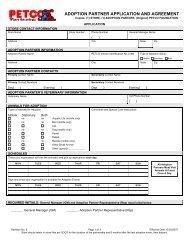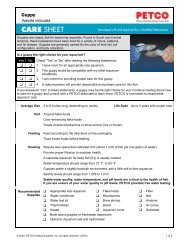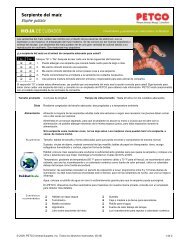Create successful ePaper yourself
Turn your PDF publications into a flip-book with our unique Google optimized e-Paper software.
<strong>Tropical</strong> <strong>Lizards</strong>Includes green anole, water dragon and mountain horned lizardMany tropical lizards change color, depending on temperature and mood.<strong>Tropical</strong> lizards include species of ameiva, anole, curlytail, Lacerta, swift,water dragon, mountain horned lizard and neon tree dragon. They can be greatpets for those getting started with reptiles.Is a tropical lizard the right companion animal for you?Yes No Check “Yes” or “No” after reading the following statements: 1. I can accommodate a habitat requiring an electrical heat source. 2. I want a pet that doesn’t need to be cuddled or touched. 3. I feel comfortable feeding live food to a lizard. 4. I can commit to providing proper care for a tropical lizard. 5. A mature person will provide responsible and primary care for this companion animal.If you answered “Yes” to these statements, a tropical lizard may be the right choice for you! Continue readingabout how to care for a tropical lizard and consult with a PETCO associate to learn more. PETCO is committedto responsible companion animal care.Average Size 4 to 36 inches longLife Span Up to 15 years with proper careDiet Live insects, such as crickets and mealworms; appropriate sized thawed, frozen rodents,warmed to room temperature; may require live food; many require lots of water provided eitherin a shallow bowl, or by misting; Some species may also eat dark, leafy greens, chopped orgrated carrots, squashFeeding Feed adults every other day; juveniles daily; provide a multiple vitamin/mineral supplementonce or twice a week and calcium dailyHousing Due to the varied sizes and growth rates of reptiles, and their individualized needs, werecommend you consult your qualified reptile veterinarian and a book on this species todetermine it’s specific housing requirementsRecommendedSuppliesDepends onspeciesSize – Appropriate size and shape habitat to accommodate normal behaviors and exerciseHabitat – Provide a hiding area; branches for basking; an incandescent light with access to acooler area; maintain humidity of 60 to 80% by misting dailySubstrate – Use pelleted or mulch type; lizards may eat their substrate, if they do, switch tosomething they cannot eat, like paper or cage carpet, or an edible substrateTemperature – Temperature gradient (100° F. for the warm end and 70° F. for the cool end);recommend radiant heat; use an incandescent light or ceramic heater as primary heat sourceLighting – Provide needed UV rays with full spectrum fluorescent light for 10 to 12 hours aday; incandescent bulb is needed for basking area if not using a ceramic heaterWater – Some tropical lizards do not drink directly from a bowl and rely on moisture on nontoxicplants and in collecting pools in the tank; also provide large deep bowl of fresh, chlorinefreewater for drinking or bathing (for semi-aquatic tropical lizards)Males should be housed separately; do not house different species of reptiles together Habitat with secure lid Humidity gauge Thermometer Basking rock or log Vitamin/mineral supplement Substrate Drip system – anoles Undertank heater Mist bottleFull spectrumfluorescent lightBook about tropical lizardsIncandescent light or ceramicheater© 2009, PETCO Animal Supplies, Inc. All rights reserved. (0315) 1 of 2Non-toxic plants,branches
<strong>Tropical</strong> <strong>Lizards</strong>Includes green anole, water dragon, and mountain horned lizardNormalBehavior andInteractionHabitatMaintenanceGroomingand HygieneNever grab lizards by their tails, as they may detach it if pulledSome tropical lizards become highly stressed when handled; regular handling is notrecommendedThoroughly clean the tank at least once a week: set lizard aside in a secure habitat; scrub thetank and furnishings with a 3% bleach solution; rinse thoroughly with water, removing all smellof bleach; add clean substrateAlways wash your hands before and after touching your lizard or habitat contents to helpprevent Salmonella and other infectious diseases<strong>Lizards</strong> regularly shed their skin; ensure humidity of habitat is appropriate to allow propershedding; to facilitate shedding, provide a large container or tub so the lizard can immerseentire bodyPregnant women and people with weakened immune systems should contact their physicianbefore purchasing and/or caring for a tropical lizard and should consider not having a tropicallizard as a pet. For more information regarding tropical lizards and disease, contact theCenter for Disease Control at http://www.cdc.gov/healthypets/ and PETCO athttp://www.petco.com/pet care info/animal care sheets.Signs of aHealthy Animal• Active and alert• Healthy skin• Clear eyes• Eats regularly• Clear nose and vent• Body and tail are rounded and fullCommonHealth IssuesHealth Issue (alpha) Symptoms or Causes Suggested ActionGastro-intestinalDiseaseMetabolicBone/VitaminDeficiencyRespiratory DiseaseRunny stools, caked or smearedstool around the vent area, and lossof appetite caused by bacterial orparasitic infection.Inability to absorb calcium due toinsufficient UVB light. If untreated,can lead to a disorder characterizedby deformities and softened bones.Swollen limbs and lethargy.Labored breathing, runny nose,swollen eyes. Can be caused bytemperatures that are too cold.Consult your exotic animalveterinarian.Provide ample UVB lightingand consult your exoticanimal veterinarian.Ensure proper lighting, water,and basking conditions. Ifcondition persists, consultyour veterinarian.Red Flags• Weight loss or decreased appetite • Mucus in mouth or nose• Swelling• Lethargy• Bumps, sores, or abrasions on skin • Labored breathing• Paralysis of limbs or tail• Abnormal fecesIf you notice any of these signs, please contact your exotic animal veterinarian.Sources Anoles, Basilisks, & Water Dragons: A Complete Pet Care Manual by Richard D. BartlettNote: The information on this Care Sheet is not a substitute for veterinary care. If you need additionalinformation, please refer to the above sources or contact your veterinarian as appropriate.2 of 2 SKU 926736 © 2009, PETCO Animal Supplies, Inc. All rights reserved. (0315)



